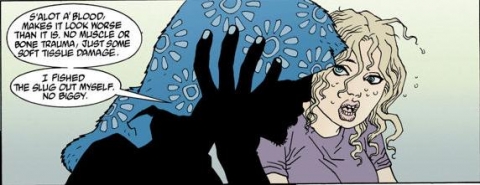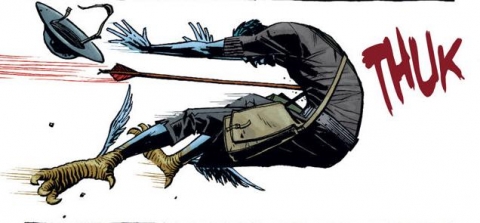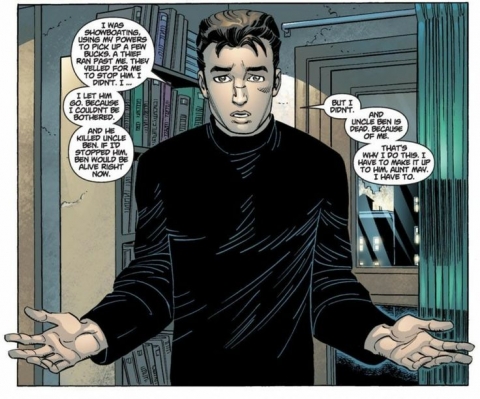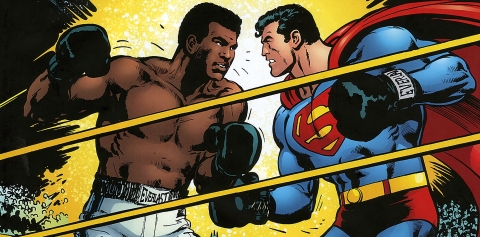52 weeks. 52 different writers. 2 trade paperbacks or hardcovers a week. Each week I’ll take a look at a different writer and read two different collected editions from within that person’s repertoire to help in the examination of their work.
Brian Azzarello first truly gained prominence in the comic industry through his work on his creator owned title “100 Bullets”. Drawn beautifully by Eduardo Risso, the sprawling crime epic gained critical and fan acclaim for much of its run, with Azzarello and Risso winning an Eisner award in 2001 for Best Serialized Story for the storyline “Hang Up On The Hang Low”. On top of that Eisner award, Azzarello and Risso would also win Eisner Awards in 2002 and 2003 for their work on the series, winning the awards for Best Writer, Best Artist, and Best Continuing Series. Azzarello and Risso wrapped up the series after just under a decade of working on it, producing 100 issues and crafting one of the greatest crime stories to ever grace the medium of comics.
100 Bullets Deluxe Edition Book One
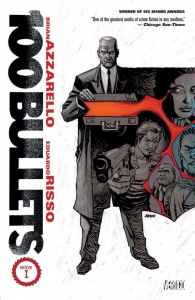 What would you do if you could kill someone who had wronged you without any form of consequence? That’s a question 100 Bullets seeks to answer, placing plenty of characters into hard position and forcing them to make the ultimate choice: to take a life. Agent Graves is an old man in a sharply tailored suit who appears, offering men and women their chance at revenge. Graves carries around an attaché that houses a pistol, one hundred rounds of ammunition, and all the necessary documents to prove that the person you have the option to kill did in fact wrong you or ruin your life in some way. But like anything in life, nothing can be so simple. Each person given the attaché is told the rules under which they must operate to ensure they aren’t arrested for the crime that they are about to potentially commit. Things become more complex when characters begin to realize and reveal that they aren’t who they say they are, adding more questions than answers to an intriguing series.
What would you do if you could kill someone who had wronged you without any form of consequence? That’s a question 100 Bullets seeks to answer, placing plenty of characters into hard position and forcing them to make the ultimate choice: to take a life. Agent Graves is an old man in a sharply tailored suit who appears, offering men and women their chance at revenge. Graves carries around an attaché that houses a pistol, one hundred rounds of ammunition, and all the necessary documents to prove that the person you have the option to kill did in fact wrong you or ruin your life in some way. But like anything in life, nothing can be so simple. Each person given the attaché is told the rules under which they must operate to ensure they aren’t arrested for the crime that they are about to potentially commit. Things become more complex when characters begin to realize and reveal that they aren’t who they say they are, adding more questions than answers to an intriguing series.
Brian Azzarello crafts one of the best pieces of crime fiction I’ve ever had the pleasure of reading with this first volume of 100 Bullets. 100 Bullets follows dozens of interconnected characters, all woven together by an offer made from the same mysterious character. Agent Graves, a shady man who used to work for an enigmatic organization called “The Trust”, offers strangers a literal shot a revenge as he gives seemingly random people a briefcase with a gun, one hundred rounds of ammunition and documents that detail facts about a particular person who has done something to wrong them. Graves warns these strangers about telling other people about the case, urging against it as things won’t turn out well for them if they do. All these characters that Graves decides to approach seem as though they are all randomly selected but that couldn’t be further from the truth. The deeper you delve into the brilliant story Azzarello has built, the more you realize that everything is connected. There are so many layers and levels to this story, diving into plenty of unpredictable areas and directions that will surely surprise you and have you coming back for more every time.
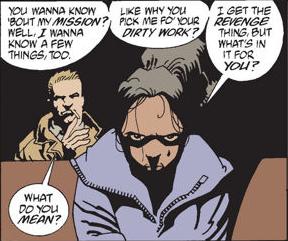 In trying to talk about the characters that Azzarello uses and introduces, I almost become overwhelmed. Not because there is something terribly wrong about these characters or story but because of the sheer complexity that seems to be at play. There are so many characters that get introduced in this collection, which houses twenty issues and multiple arcs, that it is easy for you to lose track. As a reader it feels like that should be a negative stroke against a writer, feeding almost too much information to process, but with Azzarello’s 100 Bullets this is absolutely the perfect way for things to be.
In trying to talk about the characters that Azzarello uses and introduces, I almost become overwhelmed. Not because there is something terribly wrong about these characters or story but because of the sheer complexity that seems to be at play. There are so many characters that get introduced in this collection, which houses twenty issues and multiple arcs, that it is easy for you to lose track. As a reader it feels like that should be a negative stroke against a writer, feeding almost too much information to process, but with Azzarello’s 100 Bullets this is absolutely the perfect way for things to be.
Combining multiple characters, both of major and minor status, together allows for the characters that Azzarello wants to be the central focus stand out even more as he hooks you into the drama of these characters’ lives and makes them more interesting by giving you lesser characters that you feel as though you don’t necessarily need to care about. It’s a brilliant “trick” on Azzarello’s part, as it makes things that happen to primary characters even more emotional because he goads you into investing in these characters. To an even further point it makes the minor characters even more interesting, as a character who you see as minor and easily written off can do one action to completely shift the story and suddenly they are a major player as well. I found most of the character work Azzarello did in this first volume to be some of the best character work I’ve read in comics, as I was fully invested in characters I knew for less than twenty pages. Each character introduced has some form of character arc to undertake, whether they are there for half an issue or a healthy arc. It’s the growth of these characters, whether it be a rapid change or a slow burning development, that help to push a simple but awesome premise to brilliant heights.
As I’ve pointed out multiple times, in 100 Bullets everything is connected. Even the most infinitesimal of details can nurture some sort of development down the road if you’re paying attention. 100 Bullets is a massive, sweeping crime epic unlike anything else I’ve ever read, with this first volume seeming to be rather well plotted. We’re introduced to a multitude of characters, a simple idea, a shadowy organization, and ten different questions for every answer we’re given. What Brian Azzarello seems to do so well during this first volume, and much of the praise could again be a result of his character work, is take the idea of the series and continually work it in a new way that never becomes dull.
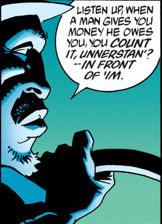 Just off the top of my head I can think of at least five different characters in this volume who are offered the briefcase from Graves. A bare minimum of five instances where characters are given a weapon and information to track down a person who has wronged them. All of these characters given the same rules, the same options, but all of the stories end in dramatically different ways. It would be easy for Azzarello to just write a story where the character is given the briefcase, goes through emotional turmoil, and then proceeds to kill their “target”. But Azzarello does something better, making you understand who these characters are and weighing the philosophical aspects of taking a life as well as the potential ripple effect it will create. Just because you take a life doesn’t mean it won’t affect other people around you and that’s something Azzarello explores at length. In some instances, the lead character finds it all too easy to pull the trigger. In other moments, the character who wields the gun couldn’t have a heavier heart. Azzarello does adhere to the law of “Chekhov’s Gun” though, a writing principle wherein all dramatic elements in a plot (like a weapon) are important and should be used at some point, while everything that doesn’t add to the dramatic nature should be thrown to the way side. As Anton Chekhov, the famous writer, states “If you say in the first chapter that there is a rifle hanging on the wall, in the second or third chapter it absolutely must go off. If it’s not going to be fired, it shouldn’t be hanging there”. Rest assured that before the end of every story, the pistol Graves gives to each character inevitably goes off, paying off the promise he bestows upon the reader by introducing the weapon in the first place.
Just off the top of my head I can think of at least five different characters in this volume who are offered the briefcase from Graves. A bare minimum of five instances where characters are given a weapon and information to track down a person who has wronged them. All of these characters given the same rules, the same options, but all of the stories end in dramatically different ways. It would be easy for Azzarello to just write a story where the character is given the briefcase, goes through emotional turmoil, and then proceeds to kill their “target”. But Azzarello does something better, making you understand who these characters are and weighing the philosophical aspects of taking a life as well as the potential ripple effect it will create. Just because you take a life doesn’t mean it won’t affect other people around you and that’s something Azzarello explores at length. In some instances, the lead character finds it all too easy to pull the trigger. In other moments, the character who wields the gun couldn’t have a heavier heart. Azzarello does adhere to the law of “Chekhov’s Gun” though, a writing principle wherein all dramatic elements in a plot (like a weapon) are important and should be used at some point, while everything that doesn’t add to the dramatic nature should be thrown to the way side. As Anton Chekhov, the famous writer, states “If you say in the first chapter that there is a rifle hanging on the wall, in the second or third chapter it absolutely must go off. If it’s not going to be fired, it shouldn’t be hanging there”. Rest assured that before the end of every story, the pistol Graves gives to each character inevitably goes off, paying off the promise he bestows upon the reader by introducing the weapon in the first place.
Collects: 100 Bullets #1-20.
Best Character: Dizzy Cordova.
Best Line Of Dialogue/Caption: “Who is the man who gave me this opportunity?” – Mr. Branch.
Best Scene/Moment: Cole remembers everything – “A Right Ear, Left In The Cold”.
Best Issue: “Hang Up On The Hang Low Part 2” (Issue 16). I don’t want to go too far into detail on this one as it would just be spoiler central. The character of Loop is presented with a shot to get revenge against someone who hurt him in a manner of speaking. There is some fantastic character work done in this story and it’s highlighted by this issue in particular. Just trust me, this issue is phenomenal. At the same time, it was incredibly difficult to pick just one issue as nearly every issue in this collection is immediately enjoyable and memorable.
Why You Should Read It: This is a thoroughly satisfying piece of crime fiction. Read this for the intricate and interweaving narrative. Or for the multitude of excellent characters. Or because, all around, this first collection in the series is amazing. There are so many stories in this one volume alone with great character beats and a plot that will keep you engaged all the way until the end that you’ll be running out to buy volume two once you finish it. There’s no padding this section up with lengthy sentences to convince you this book is worth your money. Just go buy it because that’s exactly what I did after reading it for the first time and I can’t wait to read the rest of the series from here.
Wonder Woman Volume 1: Blood
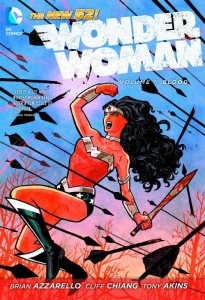 Brian Azzarello has worked on many of the big name characters over at DC Comics, ranging from Batman, to the Justice Society Of America, Lex Luthor and even the Green Lantern. He’s even managed to get his hands on the Comedian and Rorschach for their “Before Watchmen” miniseries back in 2012. But when the New 52 rolled around Azzarello, along with artist Cliff Chiang, was tasked with rebooting Wonder Woman. The two men tackled the character with an entirely new direction, revamping the style and origin of the character to critical acclaim. Over thirty issues and six collected editions later, Azzarello and Chiang certainly left their mark on the character before departing the title in late 2014, capping off what many consider to be one of the best Wonder Woman runs ever.
Brian Azzarello has worked on many of the big name characters over at DC Comics, ranging from Batman, to the Justice Society Of America, Lex Luthor and even the Green Lantern. He’s even managed to get his hands on the Comedian and Rorschach for their “Before Watchmen” miniseries back in 2012. But when the New 52 rolled around Azzarello, along with artist Cliff Chiang, was tasked with rebooting Wonder Woman. The two men tackled the character with an entirely new direction, revamping the style and origin of the character to critical acclaim. Over thirty issues and six collected editions later, Azzarello and Chiang certainly left their mark on the character before departing the title in late 2014, capping off what many consider to be one of the best Wonder Woman runs ever.
When Zeus suddenly disappears there is a sudden power vacuum left amongst the Gods of Olympus. With the position of “Ruler of the Gods” now vacant, many Gods begin to vie for the available power and take control. Zeus’ wife, Hera, is amongst the worst offenders, seeking to take the position for herself whilst also trying to hunt down and kill any of Zeus’ illegitimate children. In doing such, Hera seeks to destroy any opposition she could have to be the rightful heir. Caught in the midst of all of this is Wonder Woman, who becomes responsible for protecting Zola, a woman who is unknowingly pregnant with one of Zeus’ children. After Hermes narrowly avoids death while saving Zola, the three characters band together to ensure Zola’s survival and also discover some startling truths surrounding the origins of Wonder Woman. What Wonder Woman discovers forever changes her life and sets her on a whole new path against Hera during Zeus’ absence.
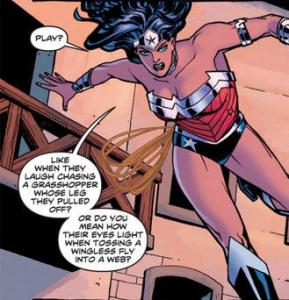 Greek mythology and superheroes violently collide in Brian Azzarello’s first volume of the New 52’s “Wonder Woman”. Azzarello takes notable Greek gods and throws them into the world of Wonder Woman, resulting in a brilliant book that twists the history of both the Gods and Wonder Woman. It’s largely what makes this first volume such an enthralling read, blending together the histories of these Gods and Wonder Woman to add a whole new chapter to these different sets of characters. It’s as if Azzarello himself is trying to pen a modern myth which stars Wonder Woman, never shying away from introducing these Gods into her life and showing how their presence positively or negatively affects her future. I guess in some respects you could consider this first volume the starting chapter of two unraveling myths that are tightly intertwined, telling the tale of Wonder Woman’s inclusion amongst the Gods of Olympus as well as the beginning stages of the battle for the title of “Ruler Of Olympus”. Although much more focus is placed on the former as opposed to the latter, Azzarello does a brilliant job of using these two different storylines to compliment each other, using one to feed the other in between the major plot points that Azzarello is trying to hit.
Greek mythology and superheroes violently collide in Brian Azzarello’s first volume of the New 52’s “Wonder Woman”. Azzarello takes notable Greek gods and throws them into the world of Wonder Woman, resulting in a brilliant book that twists the history of both the Gods and Wonder Woman. It’s largely what makes this first volume such an enthralling read, blending together the histories of these Gods and Wonder Woman to add a whole new chapter to these different sets of characters. It’s as if Azzarello himself is trying to pen a modern myth which stars Wonder Woman, never shying away from introducing these Gods into her life and showing how their presence positively or negatively affects her future. I guess in some respects you could consider this first volume the starting chapter of two unraveling myths that are tightly intertwined, telling the tale of Wonder Woman’s inclusion amongst the Gods of Olympus as well as the beginning stages of the battle for the title of “Ruler Of Olympus”. Although much more focus is placed on the former as opposed to the latter, Azzarello does a brilliant job of using these two different storylines to compliment each other, using one to feed the other in between the major plot points that Azzarello is trying to hit.
Before I touch on the cast of characters I’d like to take a moment to highlight the work Azzarello does with the title character throughout the volume first, giving readers a perfect portrayal and more specifically a brilliant update to her origin. Original conceived of clay by the Amazonian Queen, Hippolyta, Wonder Woman was created instead of birthed, freeing her from having any attachment to men. In doing this, Wonder Woman plays up the freedom and independence of the Amazonian culture, a group of warrior women who rely only on their own skills and themselves to survive. To fit in with his story though, Azzarello makes a simple but fantastic overhaul to that origin, serving to be a driving force to the narrative going forward. This monumental change in origin is a shocking moment to Wonder Woman and conveys the strong conviction and morals of the character in such a brilliant way. Azzarello takes the changes he made and uses them to add a sense of tragedy to who Princess Diana (a.k.a. Wonder Woman) is. It’s right in the middle of this volume that Azzarello springs this change on the reader, shifting your understanding of Diana dramatically in a split second that ripples out through the remainder of the volume. In the early stages we are shown an awesome Amazonian warrior in Diana, who is a little sarcastic, powerful, playful but still serious. She reacts unbelievably to the new information about her that changes her entire life and the story you’re reading. Azzarello allows for this warrior to be vulnerable, honest, and heartbroken but then reels it all back in to show the true heart of Diana’s character, her drive. Wonder Woman is capable of drawing herself back from a state of devastation time and time again to complete the task at hand no matter what is weighing on her at the time. She’s a character with a heavy heart but has an even stronger sense of commitment for what needs to be done. It’s for this reason alone that Azzarello’s Wonder Woman work is worth picking up.
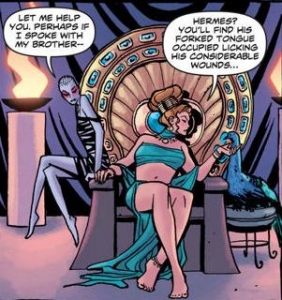 How well Wonder Woman is written as a character is just the start of the joy Azzarello injects into the quality of the characters he writes. In formulating the plot around a gather of Greek Gods, Azzarello allows himself to draw on a seemingly endless supply of deep characters to play with. Azzarello splits the cast of Gods up amongst your average three alignments of good, evil, and neutral. Hermes falls on the good side of the spectrum, with Hades, Poseidon, and Strife being neutral, and Hera obviously being part of the evil spectrum. There are a few other Gods sprinkled in throughout the rest of this first volume, and allusions to even more on top of that, but for the most part it is largely the Gods I just mentioned who factor into the plot the most. Hermes is part of Wonder Woman’s “team”, working with her to protect Zola, with his motivation seemingly being that he’s just trying to be one of the good guys. Hades and Poseidon only factor in because of the absence of Zeus, intrigued by the appealing prospect of being a Ruler of more than their primary domains. Without much else to tether them to the story, these characters for the most part only factor in towards the end of the tale and even then only one of them does anything that will have future repercussions. Strife is the most interesting character amongst the Gods during this first volume, barely walking the line between being good and evil. She initially appears as a character out to create chaos and disrupt Wonder Woman’s life but it’s ultimately her inclusion in the story that reveals secrets to Wonder Woman about who she truly is. After these revelations come to light, she too appears to be an unofficial “member” of Wonder Woman’s team for a bit, meshing in with the rest of the cast responsible for protecting Zola from Hera. Hera’s motivations for being the “antagonist” to the story are obvious, driven from jealousy over the adulterous ways of her husband Zeus. When the vacancy occurs in his absence, greed and that aforementioned jealousy are more than enough to motivate Hera to reach out to become the Ruler. It’s the collision course Azzarello sets these Gods on with Wonder Woman that provides some of the best moments you’ll find in this first volume.
How well Wonder Woman is written as a character is just the start of the joy Azzarello injects into the quality of the characters he writes. In formulating the plot around a gather of Greek Gods, Azzarello allows himself to draw on a seemingly endless supply of deep characters to play with. Azzarello splits the cast of Gods up amongst your average three alignments of good, evil, and neutral. Hermes falls on the good side of the spectrum, with Hades, Poseidon, and Strife being neutral, and Hera obviously being part of the evil spectrum. There are a few other Gods sprinkled in throughout the rest of this first volume, and allusions to even more on top of that, but for the most part it is largely the Gods I just mentioned who factor into the plot the most. Hermes is part of Wonder Woman’s “team”, working with her to protect Zola, with his motivation seemingly being that he’s just trying to be one of the good guys. Hades and Poseidon only factor in because of the absence of Zeus, intrigued by the appealing prospect of being a Ruler of more than their primary domains. Without much else to tether them to the story, these characters for the most part only factor in towards the end of the tale and even then only one of them does anything that will have future repercussions. Strife is the most interesting character amongst the Gods during this first volume, barely walking the line between being good and evil. She initially appears as a character out to create chaos and disrupt Wonder Woman’s life but it’s ultimately her inclusion in the story that reveals secrets to Wonder Woman about who she truly is. After these revelations come to light, she too appears to be an unofficial “member” of Wonder Woman’s team for a bit, meshing in with the rest of the cast responsible for protecting Zola from Hera. Hera’s motivations for being the “antagonist” to the story are obvious, driven from jealousy over the adulterous ways of her husband Zeus. When the vacancy occurs in his absence, greed and that aforementioned jealousy are more than enough to motivate Hera to reach out to become the Ruler. It’s the collision course Azzarello sets these Gods on with Wonder Woman that provides some of the best moments you’ll find in this first volume.
In terms of the setting for the story, Azzarello shifts around from location to location rather frequently, with the only truly notable locale being that of Wonder Woman’s home, Paradise Island. Due to the narrative, there isn’t much need for the characters to stay in one spot for too long as the idea is that they are somewhat on the run, trying to keep Zola and her unborn child out of the clutches of Hera. In that regard, Azzarello is wildly successful as the constantly changing setting of the story helps to hammer home that element of the plot. At the same time, when Azzarello chooses to settle the story on Paradise Island for a few issues, he gets across the entire nature of the island brilliantly. Thanks also in part to the artistic skills of co-creator Cliff Chiang, Azzarello helps the reader to understand the Amazonian culture, showing the reader that this is a community of powerful women who don’t need men whatsoever. It even bleeds through from the dialogue shared by the Amazons and paints a vivid picture of their lifestyle. It’s the simple things that Azzarello does through the dialogue, like Hermes reminding Zola to not broadcast her love for men while she’s on Paradise Island, that only enhance the reading experience and fully immerse you into the setting whilst you’re there. Whether it’s seclusion on Paradise Island or duking it out with Poseidon in London, Azzarello gets everything right with Wonder Woman and the world she has to play in.
Collects: Wonder Woman #1-6.
Best Character: Wonder Woman.
Best Line Of Dialogue/Caption: “I like men Hermes. And I’m not gonna apologize for that.” – Zola.
Best Scene/Moment: Wonder Woman pushes past the truth – Issue 3.
Best Issue: Issue 3. This issue is where everything changes for Wonder Woman. Along with the reader, she discovers that her origin is not exactly what she thought it was, having been lied to for her entire life. Instead, we get an updated origin for the character that brilliant works within the confines of the story and with the available characters. It all ends up making so much sense that you kind of wonder why someone hadn’t thought of doing something like this sooner. You get an origin story that isn’t boring, crass, or slow, still honours the character’s ideals and is just solid all around. It also ends in a way that I believe is a perfect representation of who Wonder Woman is as a character. If that isn’t enough for you then take solace knowing that from start to finish this issue is loaded with meaningful character moments and interesting scenes that spin the series in a compelling direction.
Why You Should Read It: Who doesn’t love a little bit of Greek and geek mythology? This is a fantastic blend of mythology with superheroes that works as a myth, superhero story, character drama and a multitude of different styles of story on top of the few I’ve mentioned. Azzarello masterfully includes characters from Greek mythology into the history of Wonder Woman and it all makes sense. There’s as much drama and heartbreak in this first volume as there is bone crunching action that will leave you tantalized by the magnificent events on display throughout. This is an awesome Wonder Woman story any fan must read. To an even further point though, I’d readily recommend you read this if you enjoy the comic or film, 300 or Jason Aaron’s “Thor, God Of Thunder”. Even if you just like books with history or the Greek gods then this book is right up your alley.

